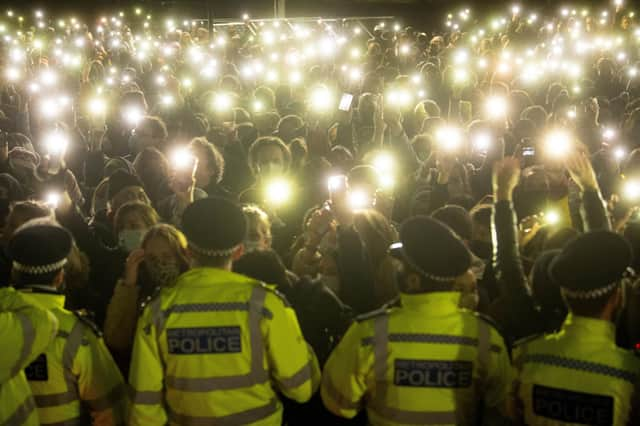Police tactics at Sarah Everard vigil were shameful - Alison Johnstone


Covid restrictions meant that around the country women felt unable to truly reclaim the streets to pay their respects to Sarah Everard a woman murdered while walking home at night.
Like many others, I lit a candle at home, but those who did attend peaceful vigils did not deserve heavy-handed police aggression. I agree with the Fire Brigades Union who called the actions “draconian and authoritative” which have no place in a democracy. It was a shameful response by police.
Advertisement
Hide AdAdvertisement
Hide AdThe nature of this protest itself was against violence. It was a peaceful vigil to condemn the violence experienced by women every day, the violence that makes women feel unsafe walking home at night.
That this protest should be met with violence is disturbing. So, too was the statement in response from the Met, which said officers were “placed in this position because of the overriding need to protect people’s safety”. This is an all-too-familiar trope for women who experience violence: you made us do it. The fact it was a Met police officer who has been charged with her murder is not lost on us.
It was difficult not to contrast the scenes with the images of thousands of football fans taking to the streets to celebrate with no masks or distancing in place, escorted to George Square by police where they proceeded to destroy memorial benches. They too, flouted strict Coronavirus rules and ignored calls from police not to attend. But they were treated very differently, where police stood back and did not want to escalate the situation.
The contrast perhaps shows that there is a different culture between Police Scotland and the Metropolitan Police, but it also shows how disproportionately women can be treated.
Advertisement
Hide AdAdvertisement
Hide AdIf it is safer to let football fans mix with each other, drink and destroy things than to disperse them, why is it safer to manhandle women to the ground when they are sitting peacefully with a candle than leave them be?
Whatever the operational reasoning, it sends a clear message that violence against women is acceptable.
It is ironic that those who have the ultimate responsibility over the policing decisions in London are both women. The first female commissioner since the founding of the Metropolitan police, Cressida Dick, stood by her men, while the Home Secretary Priti Patel called the scenes in Clapham “upsetting”, but is in the process of rushing new laws through Westminster that seek to silence protests even further and give police more powers to stop them.
These were laws drawn up in response to the Black Lives Matter protests. They increase the penalties for attacks on statues but do not mention women once.
Advertisement
Hide AdAdvertisement
Hide AdThese laws are sinister, and while they won’t apply in Scotland we must ensure they don’t foster a culture in policing that prevents democratic voices being heard. When the world descends on Glasgow later this year to discuss the climate emergency, the right to peaceful protest must upheld and celebrated.
Alison Johnstone is a Green MSP for Lothian region